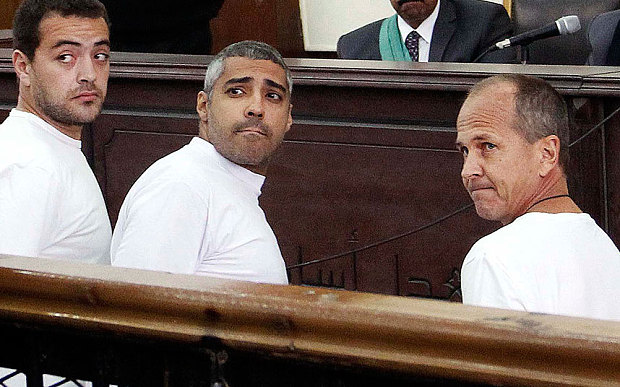“So, who knows whether this [case] will be political or not, if it is a guilty verdict, damn right it is political.” – Sue Turton.
The verdict of delayed retrial of two Al Jazeera journalists, set to take place in Cairo on August 29, may influence the sentences of another seven journalists convicted of the same offences as Australia’s Peter Greste.

The verdict is not expected until September, after the summer recess.
Baher Mohamed and Mohamed Fahmy were to be retried alongside Greste after Egypt’s Court of Cassation accepted their appeal on grounds of lack of evidence against them on January 1 this year.
Mohamed and Fahmy were released on bail whilst Greste was deported and the other six journalists fled the country in 2013.
As she sat in an armchair at the Al Jazeera headquarters in Doha, one of the six Al Jazeera journalists who fled Sue Turton, has been following the retrial closely through what means she can, other reports and social media.

“It’s really difficult for us to follow what goes on in Egypt because obviously we [Al Jazeera] have no reporter anymore on Egyptian soil –we can’t, it’s impossible,” she said
“So all I can do is sit here and watch what is coming out on the twitter-sphere.”
Ms Turton was forced to resign after she was convicted in absentia and sentenced to 10 years prison for aiding terrorists and spreading false news as she could no longer do her job as a correspondent.
Before the retrial was abruptly adjourned on June 12, Ms Turton was hoping the court would allow the completion of the defence summation so a verdict could be handed down in the next session.
Turton said a not-guilty verdict for the two on trial could mean there would be a chance for the others to have their convictions overturned.
“For us it means that we have no clue to which way this is going to swing. If [Mohamed and Fahmy] are acquitted, then we would hope that would give us a very good chance we could get our convictions acquitted as well,” she said.
However, as defence lawyers were unable to present the whole case, there is a chance the judge may again adjourn the case again.
“There is usually a gap between the end of the summation and the verdict, we really are on the eleventh hour before the summer recess,” she said.
“And that would mean this could carry on until September which will be hugely stressful for the guys in Cairo and for Peter who’s watching it from afar too going: ‘what does this mean? for the rest of us?'”
The award winning journalist said it was near-to-impossible to understand what is going on, as the Egyptian legal system is unfamiliar.
“I have covered a lot of court in the UK in the old Bailey and the central court in London and this does not follow any pattern that I am used to. It is very difficult for us to … get a clue as to which way it is going, it is just impossible.”

Relations between Al Jazeera’s host country, Qatar, and Egypt have been strained since Al Jazeera Arabic-language news channels attracted criticism for what many saw as bias in their reporting on the overthrow of President Mohamed Morsi’s government in Egypt in 2013.
Qatar’s backing of the Muslim Brotherhood may have affected the way the current regime viewed all of Al Jazeera’s reporting.

Adjunct Professor and expert on Middle Eastern issues at the Australian National University Dr. Robert Bowker suggested the Sisi government’s crackdown on Al Jazeera had not distinguished between the different arms of the Al Jazeera news operation.
“The Egyptian security and prosecutorial authorities [were] overzealous in their pursuit of their campaign and not appreciating the distinction between Al Jazeera Arabic which was definitely presenting a biased view of the brotherhood and of Egypt whereas Al Jazeera English was providing a relatively balanced innocuous coverage of domestic developments in Egypt.”
At the time of the first trial, the Egyptian judiciary pursued the case as it saw fit in the circumstance, Dr Bowker said.
“[The court] failing to get the guidance it should have probably received from the political level, proceeded to pursue the case according to its own vision of what was appropriate under the circumstances and without any real appreciation of the wider consequences.”

The judge presiding over this case now, had been the first judge one who convicted Muslim brotherhood supporters to death and had not noticed Peter Greste had been deported to Australia, said Ms Turton.
“He [the judge] didn’t even realise that Peter had been deported and he has been saying throughout the sessions: ‘Why isn’t Peter Greste here?’ So you think hang on, you can’t be political at all if you see how much media attention Peter’s deportation got in Egypt,” she said.
The case of Al Jazeera’s journalists has provoked international outcry and has contributed to Egypt’s struggling economy through a near-total collapse in tourism.
“I think [the Egyptian government] just want this to go away because they probably see that the publicity this has generated hasn’t done Egypt any good on this road back to democracy,” she said.
“So, who knows whether this [case] will be political or not, if it is a guilty verdict, damn right it is political.”


